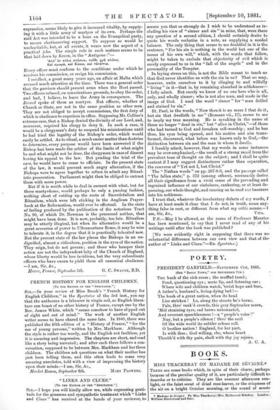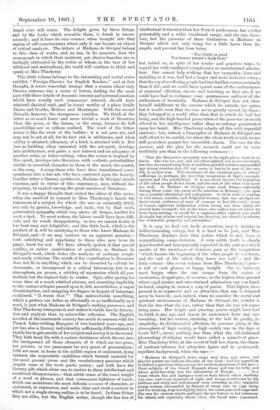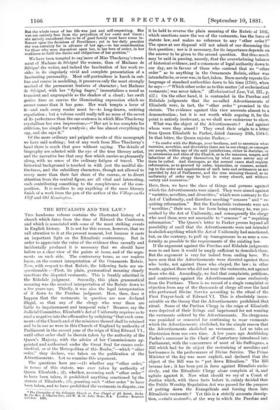BOOKS.
MISS THACKERAY ON MADAME DE SEVIGNE.* THERE are some books which, in spite of their charm, perhaps: because of the peculiar quality of it, are particularly difficult to• describe or to criticise. They are like summer afternoon sun- light, or the faint scent of dried rose-leaves, or the crispness of the air on a bright October morning, or the sound of music-
* Madams de Sdei pd. By Miss Tbackeray (Mrs. Richmond Ritchie). London William Blackwood and Sons.
heard over still water. The delight given by these things, and by the books which resemble them, is drunk in uncon- sciously; and it loses its very essence when brought into that region of self-consciousness where only it can become an object of critical analysis. The letters of Madame de Sevign4 belong to this class of works, and so, too, in its measure, does the monograph in which their insistent, yet elusive beauties are so feelingly celebrated by the writer of whom, in the face of her wifehood and matronhood, the world will continue to think and speak as Miss Thackeray.
This little volume belongs to the interesting and useful series entitled, "Foreign Classics for English Readers," and at first thought, it seems somewhat strange that a woman whose only literary outcome was a series of letters, dealing for the most part with those details of domestic interest and personal emotion which have usually such evanescent interest, should have attained classical rank, and be found worthy of a place beside Dante and Goethe, Moliere and Montaigne. With the second thought, however, the strangeness vanishes. We think of the letter as so much lower and more trivial a work of literature than the poem, or the drama, or the essay, because its full possibilities are so seldom realised. The work of the letter- writer is like the work of the builder ; it is not pure art, and may not be art at all, for its first end is utilitarian, and when utility is attained, adequacy, of a kind, is attained with it. But just as building, when saturated with the art-spirit, develops into architecture, and gains a new interest and an adequacy of another order, so letter-writing, when the writer is inspired by this spirit, develops into literature, with :esthetic potentialities similar in essential character to those of the novel, the sonnet, or the song. Among those who have thus transformed corre- spondence into a fine-art, who have conferred upon the homely, familiar letter a literary apotheosis, Madame de Sevign6 stands supreme, and in virtue of this supremacy, may, without im- propriety, be ranked among the great masters of literature.
It was a happy thought that visited the editor of this series, when she resolved to commit to Miss Thackeray's hands the treatment of a subject for which she was so eminently fitted, not only by genius, knowledge, and taste, but by that swift, penetrative sympathy which was, above all things, needful for such a task. To most writers, the labour would have been diffi- cult, and its result disappointing : to her, we cannot doubt, it has been easy and delightful ; and this little book, which is the product of it, will be satisfying to those who know Madame de Sevigne, and—if we may venture on an apparent paradox— both satisfying and appetising to those who, save from its pages, know her not. We have already spoken of that special quality, or rather combination of qualities, in Madame de Sevigue's work, which defies the analysis of ordinary rough- and-ready criticism. The worth of her contribution to literature does not lie in anything which can be dissected by critical in- struments, or decomposed in a critical laboratory, but in an atmosphere, an aroma, a subtlety of expression which all por- traiture but the highest fails to render. Opie, after gazing for some time at a much admired picture, and assenting implicitly to the various eulogies passed upon it, felt, nevertheless, a vague dissatisfaction, and snapping his fingers in despair of language, exclaimed, "It wants that ! " This indescribable something, which a gesture can define as effectually or as ineffectually as a word, is just what Madame de Se'vignes writing possesses, and Miss Thackeray interprets it and makes it visible less by descrip- tion and analysis than by mirror-like reflection. The English novelist of the nineteenth century has much in common with the French letter-writing Marquise of two hundred years ago, and yet has also a literary individuality sufficiently differentiated to enable her to get outside of her subject and survey it in the round. They both treat life with a certain daintiness which throws into the background all those elements of it which are too gross, too prosaic, or too passionate for airy grace of presentation ; both are most at home in the middle region of sentiment, lying between the respectable stolidities which furnish material for the most prosaic prose and the revolutionary passions which inspire some of the most poetic poetry ; and both have the literary gift which alone can do justice to these intellectual and emotional idiosyncrasies,—that subtle sense of the exact weight of a word or phrase, and that consequent lightness of touch, which can accentuate the most delicate nuances of character, or sentiment, or expression, and make clear and vivid a picture in which not a single strong outline is to be found. In these things they are alike, but the English writer, though she has less of
intellectual distinction than her French predecessor, has a fuller personality and a wider emotional range ; and she can, there- fore, feel the presence of those limitations in Madame de Se'vigne which not only bring her a little lower than the angels, and prevent her from being
" Too bright or good For human nature's daily food,"
but forbid us, in spite of her tender and gracious ways, to regard her with unalloyed complacency or unrestrained admira- tion. One cannot help wishing that her sympathy, keen and unfailing as it was, had had a larger and more inclusive sweep ; that the cry of a suffering people had touched her even m ore nearly than it did ; and we could have spared some of the enthusiasms of maternal affection, sincere and touching as they are, if we could have had iu exchange some. spontaneous outburst of the enthusiasm of humanity. Madame de S6vigne does not show herself indifferent to the sorrows which lie outside her gates, but it would seem that she was never greatly moved by them : they belonged to a world other than that in which she had her being, and the high-handed persecution of the poor was an insult offered to her intelligence, rather than an outrage perpetrated upon her heart. Miss Thackeray admits all this with regretful candour ; but, indeed, a biographer of Madame de S6vign6 can well afford to be candid, for when the whole truth is told, we are
still powerless against her irresistible charm. The case for the accuser, and the plea for the accused, could not be more truthfully put than in the following sentences :- " That the Marquise's sympathy was in the right place, there is no doubt. She was too just and too clear-sighted not to see the truth, but that she turned away from it and from painful realities, and avoided any strong emotion that (lid not seem to her to be part of her own life, is no less true. This avoidance of the vicarious pain of others' sufferings is, perhaps, the besetting temptation of highly-wrought natures and fine sensibilities. It is one which haunts the beginning of life when people do not know, and the end of life when they know too well. In Madame de Sevi,gne, some such things—especially during these years [the years of the rebellion in Brittany]—jar upon one's genuine admiration and enthusiasm. So little more is wanting to this sweet, sensible, and delightful woman, that one grudges the inadvertent evidences of want of courage to face the truth— want of honest, righteous indignation where wrong was done which she should have resented ; but at the time—the earlier time of which we have been writing—it would be a captious critic, indeed, who could do aught but admire and respect her devotion, her cheerful goodness, her wonderful sympathy and perception."
It is easy to deal out facile accusation, easy to indulge iu indiscriminating eulogy, but it is hard to be just, and Miss Thackeray displays here that justice which is only born of sympathising comprehension. A very subtle truth is clearly apprehended and transparently expressed in the sentence which speaks of the avoidance of vicarious pain as the temptation " which haunts the beginning of life when people do not know, and the end of life which they know too well " ; and the little volume—like every volume from Miss Thackeray's pen- is full of such gleams of happy insight. She is, however, most happy when she can escape from the region of casuistries, of apologies, of reserves, to the higher, freer ground where rigid justice and unrestrained admiration can run hand- in-hand, singing in unison a song of praise. This higher, freer ground is so expansive and so attractive, that one is tempted never to leave it ; and, indeed, when we consider the moral and spiritual environment of Madame de SevignC, the wonder is that she was what she was, rather than that she was not some- thing more. Her bright and piercing genius might have had its birth in any age, and drawn its sustenance from any sur- rounding ; but her nature, retaining to the last its purity, its simplicity, its disinterested affection, its genuine piety, in the atmosphere of high society, as high society was in the days of Louis XIV., seems nothing less than what the old-fashioned phraseology of religion would have called a miracle of grace.
Miss Thackeray hints at the secret of half her charm, the charm of contrast between her attractive figure and its grotesquely repellent background, when she says :—
" Madame de Sdvigne's voice rings very true, and sweet, and playful amidst the hideous discords of her time ; and her apparition is indeed a gracious vision among the reckless phantoms of her age,— those subjects of the Grand Monarch whose god was his belly, and whose good-breeding was the admiration of Europe In a Court where lies and intrigues were as daily bread, where modesty was rare, and every standard of right and wrong overthrown by the brilliant and witty and well-dressed vices crowding in, this beautiful young woman, surrounded by flattery of every sort, by high living and low thinking, kept her dignity intact, her name pure and respected. She was (to earnest minds, perhaps) far too lenient in her tolerance for others, and especially where those she loved were concerned.
But the whole tenor of her life was just and self-respecting. She was not entirely free from the prejudices of her caste and times ; she naively considered that to be of good family must have some in- fluence upon the decisions of Providence; yet in her daily practice she was certainly far in advance of her age,—in her consideration for those who were dependent upon her, in her love of order, in her readiness to fulfil the duties and obligations of her position."
We have been tempted to say"more of Miss Thackeray's treat- ment of Madame de Sevign4 the woman, than of Madame de
S6vign6 the writer, and indeed the fascination of her work re- sides in its singularly vivid and complete presentation of a fascinating personality. Most self-portraiture is harsh in out- line and coarse in modelling, it preserves only the most strongly marked of the permanent features of character ; but Madame de Sevigne, with her "flying finger," immortalises a mood as transient and ungraspable as the shadow of a cloud ; her swift genius fixes on canvas the illuminating expression which no sooner comes than it has gone. Her work tempts a lover of it—and such every reader must be—to long-drawn, untiring expatiation ; but a volume could really tell no more of the secret of its perfectness than the one sentence in which Miss Thackeray crystallises her own impressions,—" Her art is too complete for criticism, too simple for analysis ; she has almost everything to say, and she says it."
Of the more ordinary and palpable merits of this monograph we have said nothing ; but of any work from Miss Thackeray's hand there is much that goes without saying. The details of biography are selected with the eye of the true literary artist, and the narrative has that easy flow which carries us pleasantly along, with no sense of the ordinary fatigue of travel. The historical background is touched in with just the needful dis- tinctness, and the subsidiary characters, though not allowed to usurp more than their fair share of the canvas, or to divert attention from the central figure, are all vital and interesting, each contributing something to the completeness of the com- position. It is needless to say anything of the mere literary finish of a work from the pen of the author of the Tillage on the Clif and Old Kensington.
































 Previous page
Previous page